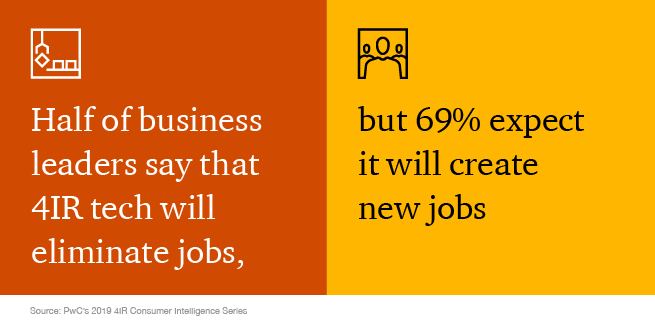
As with any technological wave, there is flux and uncertainty surrounding how workforces are affected. And, as 4IR unfolds, the verdict is still out. According to a fall 2019 PwC survey, half of business leaders say that 4IR tech will eliminate jobs, but a higher proportion (69%) expect it will create new jobs; meanwhile 45% of employees are concerned about 4IR’s impact on their job security.
Indeed, the way we work is changing rapidly, taking some tasks out of human hands through automation while spurring demand for new digital skill sets. In fact, that demand is so strong that hiring can hardly keep pace. According to one estimate, there were about 150,000 fewer data scientists in the US than needed in 2018.
Skills gaps are proving to be an impediment to success. In PwC’s 22nd annual Global CEO Survey, 55% of respondents said that the biggest impact of this skills shortage on business is the “inability to innovate effectively.”


Clearly, many companies cannot wait for enough graduates or trainees to fill current demand. To be 4IReady, companies need to redouble their own efforts to ensure their workforce is digitally fit and to cultivate leaders who understand how to work alongside technology as “citizen users”. Given the rapid rate of technological change, businesses may wish to embrace the role of a digital “finishing school” that ensures employees’ skills remain on the cutting edge. And, as companies at 4IR’s front lines already know, continual learning throughout one’s career is no longer an option: it’s a requirement.
This time, upskilling needs to look different—faster, more relevant and more collaborative—to yield a payoff on investing time and capital. It also means forming new connections between workers for greater knowledge-sharing and collaboration. Additionally, companies will increasingly need to introduce new learning around 4IR by leveraging technology in bursts—and at scale—and by focusing on user-friendly platforms (such as mobile apps, videos or podcasts) that employees are already comfortable with using in their personal lives.
In the scramble for 4IReady talent, leaders harboring traditional preconceptions or biases surrounding who possesses cutting-edge digital skills—or who is best able to acquire them—could see their companies left behind. That’s why a commitment to diversity and inclusion in the workforce isn’t just the right thing to do; it’s also good business. Young people, many of whom are “digital natives” surrounded since childhood by rapid technological change, are much more likely to be happy with work cultures that are inclusive and where everyone has a voice. Companies that foster a culture in which all are included and can see a future for themselves will likely gain a competitive edge.
Most 4IR technologies are maturing quickly, becoming less costly to adopt, and market-tested across numerous industries. Adopting these technologies ought to be a main priority for virtually any business moving into a recession.














